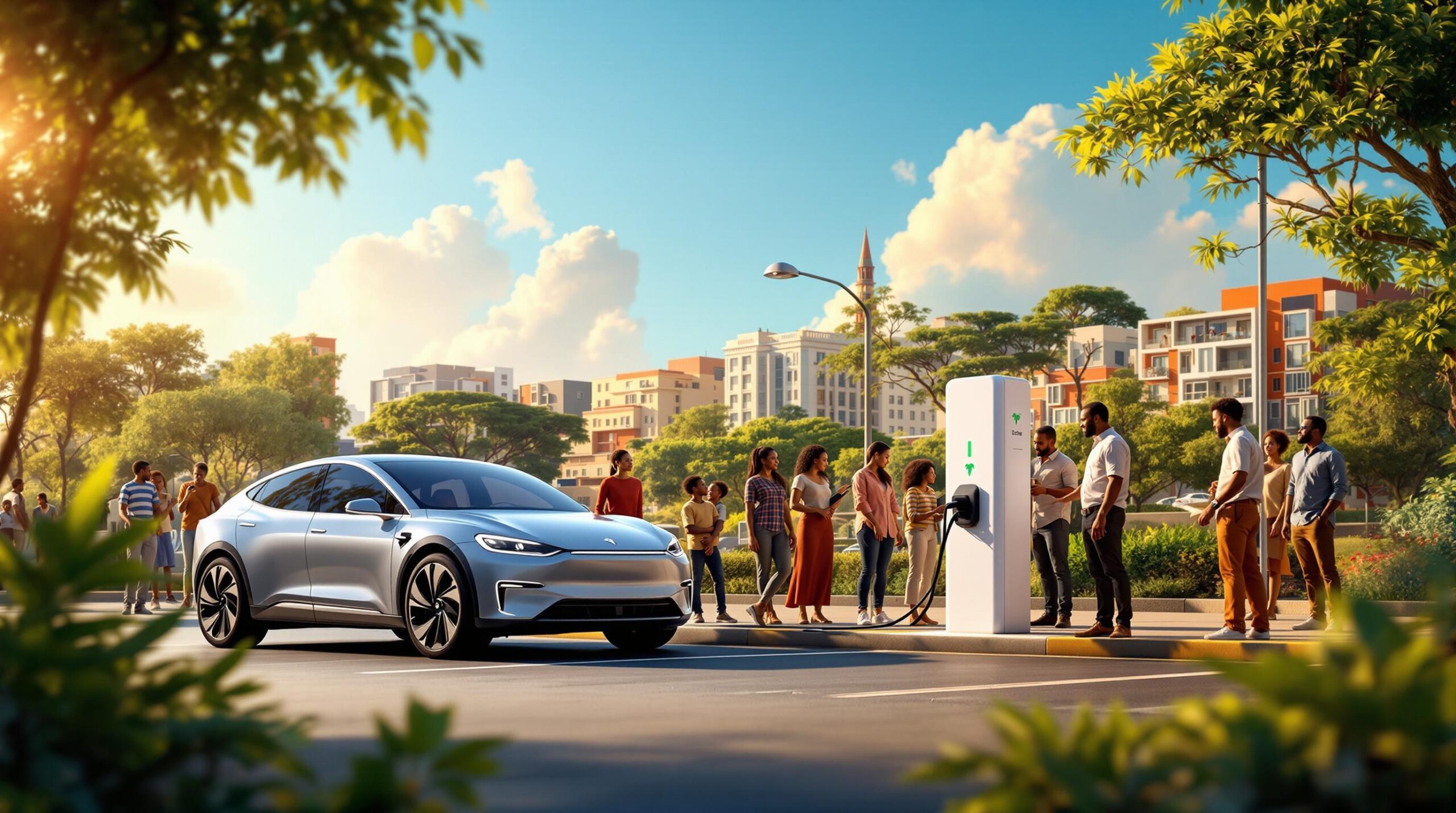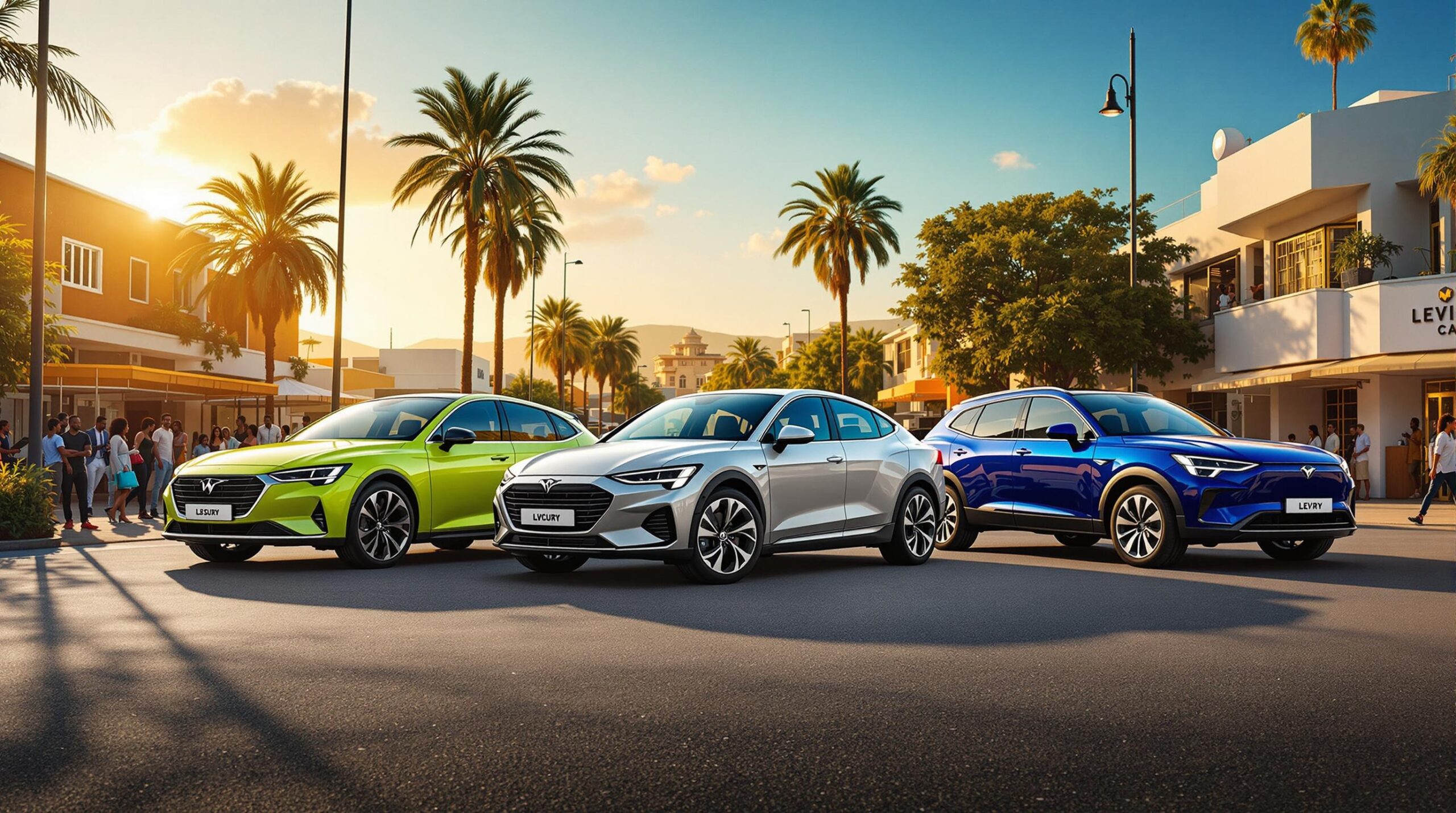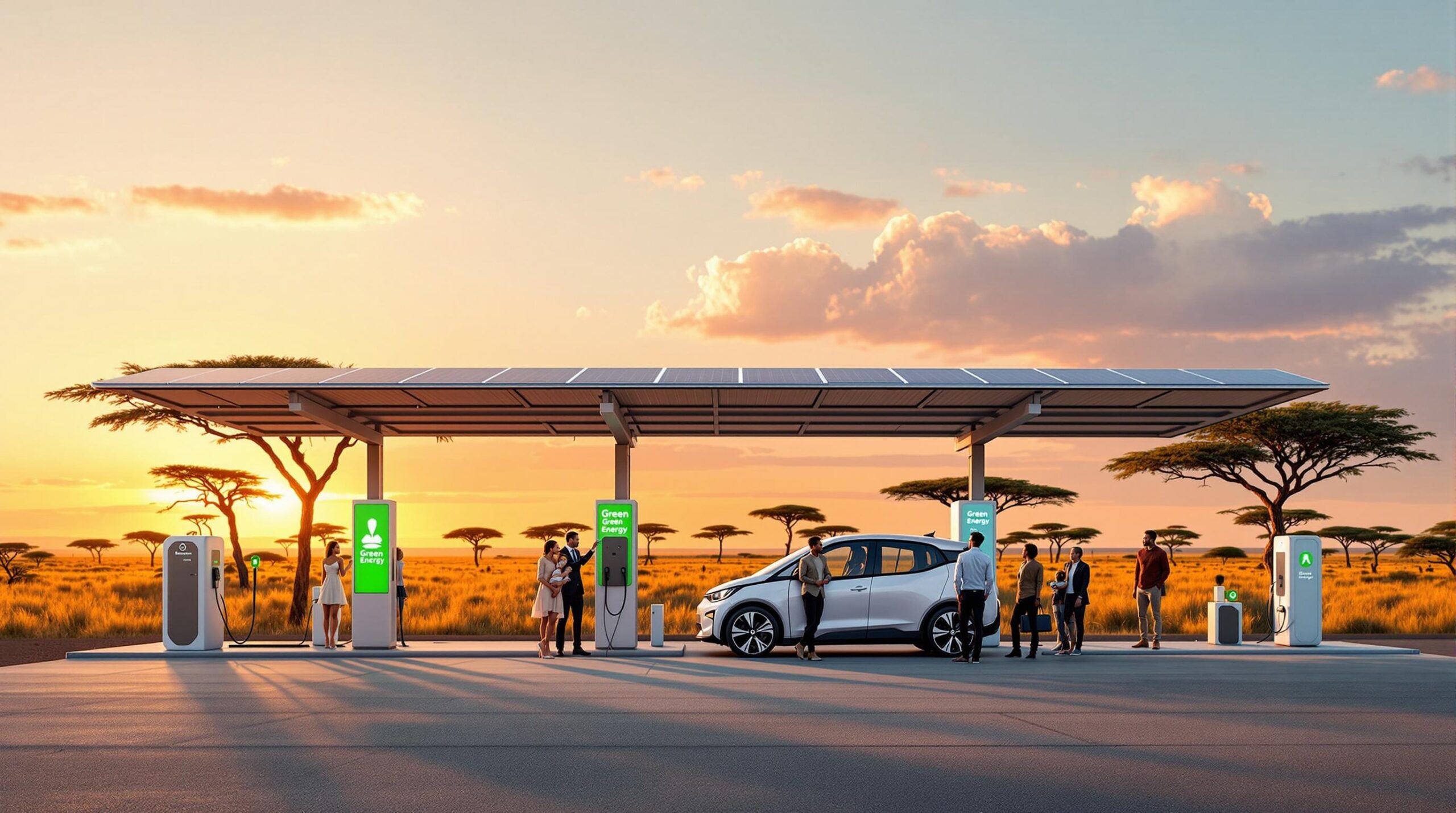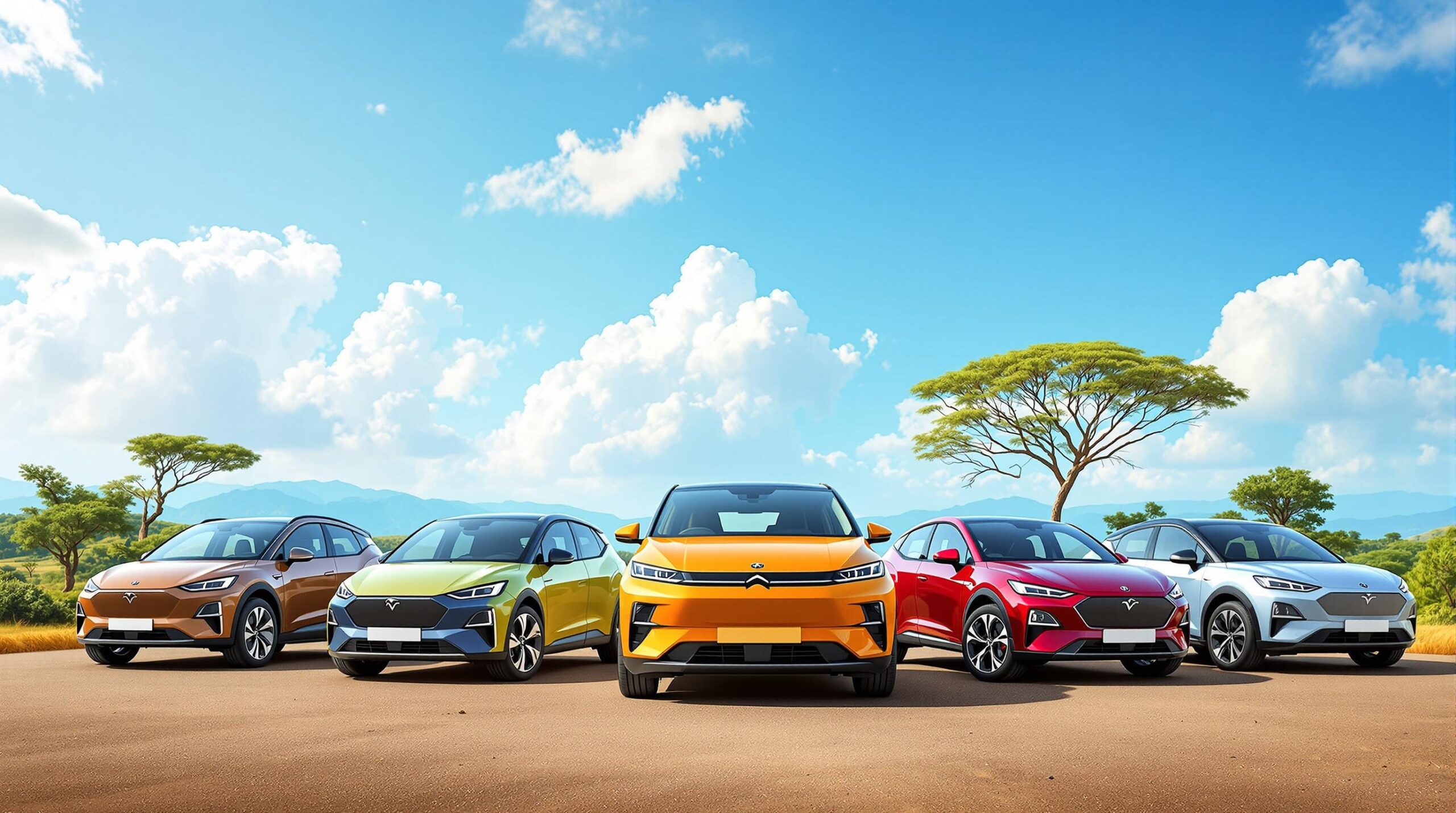
Looking to save money and go green with an electric vehicle (EV) in Africa? Here’s what you need to know:
- Tax Breaks: South Africa offers a 150% tax deduction starting in 2026 for EV and hydrogen vehicle production. Many countries, like Kenya and Rwanda, have reduced import duties and VAT for EVs.
- Direct Savings: EVs cost less to operate – up to 90% cheaper per 100 km compared to gas cars in some regions. Maintenance costs are also 30% lower.
- Charging Perks: Countries like South Africa and Kenya are building solar-powered charging stations, while Uganda and Rwanda offer special electricity rates for EV owners.
- Extra Benefits: Priority parking, reduced carbon taxes, and incentives for businesses installing chargers are available in many countries.
- Future Goals: Kenya targets 5% EV imports by 2025, Cape Verde aims for 100% EV sales by 2035, and Ethiopia has banned combustion engine imports entirely.
Quick Comparison of EV Incentives Across Africa:
| Country | Key Incentives | Goals/Targets |
|---|---|---|
| South Africa | 150% tax deduction for manufacturers | Boost local EV production |
| Kenya | 10% excise duty on EV imports | 5% of new vehicles electric by 2025 |
| Rwanda | VAT exemption, rent-free land for chargers | Comprehensive charging network |
| Ethiopia | Banned combustion vehicle imports | Fully electric vehicle imports |
| Morocco | Focus on EV manufacturing | Regional production hub |
Why it matters: EVs are becoming more affordable and accessible across Africa, thanks to government incentives, lower running costs, and expanding charging infrastructure. Ready to make the switch? Dive in to learn more.
Money-Saving Benefits for EV Buyers
Tax Reductions
Starting in 2026, South Africa will allow a 150% tax deduction on investments made in producing electric and hydrogen-powered vehicles [4]. This deduction helps reduce production costs significantly.
Currently, EVs are subject to a 25% import duty, compared to just 18% for conventional vehicles [4]. To help balance this, the government has introduced a full VAT exemption on EV sales [5]. These measures aim to make EVs more affordable for buyers, alongside the already lower operating costs.
"This incentive to boost local manufacturing is a positive step forward, but we also need to reduce the current high import duties for EVs – 25% compared to 18% for combustion engine vehicles. These taxes inflate EV prices, slow demand, and limit market growth." – CHARGE [4]
Combined, these tax perks and reduced running costs make EVs a more appealing option for consumers.
Direct Cost Savings
Electric vehicles deliver noticeable savings when it comes to daily use. Here’s a quick cost comparison [6]:
| Vehicle Comparison | Cost per 100 km in Angola | Cost per 100 km in South Africa |
|---|---|---|
| Hyundai Ioniq (EV) | $0.21 | N/A |
| Toyota Corolla (ICE) | $2.40 | N/A |
| Mercedes EQC (EV) | $0.30 | $1.49 |
| Mercedes GLE (ICE) | $2.98 | $12.20 |
These figures highlight how EVs help cut travel expenses, making them an attractive alternative to traditional vehicles.
Maintenance costs are also 30% lower for EVs [7]. This is because EVs have fewer moving parts and simpler mechanical systems. For example, a fleet of 100 EVs can save over $2 million in fuel costs within three years [7].
In West Africa, individual EV owners save between $3,000 and $5,000 annually on fuel [7]. Other perks include exemptions from carbon taxes, reduced custom duties for EV components, and special depreciation allowances for business fleets [5]. On average, operating costs drop by $15–$24 for every 250 km driven [7].
Charging Station Incentives
Funding for Charging Points
Several African countries are stepping up efforts to expand EV charging infrastructure. South Africa has committed $234 million to build a solar-powered charging network in the Free State, aiming to install 120 stations by September 2025 [9].
Zero Carbon Charge (ZCC) made headlines in November 2024 by opening South Africa’s first fully off-grid, renewable-powered charging station in Wolmaransstad. By mid-2026, ZCC plans to roll out 120 solar-powered facilities, supported by partnerships with provincial governments in Limpopo, KwaZulu-Natal, Free State, Northern Cape, and Eastern Cape [8].
Other countries in Africa are also taking action [10]:
| Country | Key Incentives |
|---|---|
| Kenya | $1.9 million investment over three years for charging stations |
| Rwanda | Rent-free land for charging station projects |
| Tunisia | Reduced custom duties (10%) on charging equipment |
| Uganda | Special electricity tariff for EV charging stations |
"This initiative promotes not only off-grid EV charging but also socio-economic benefits" – Thabo Meeko, Free State Minister [9]
These efforts are complemented by utility programs designed to lower charging costs and reduce emissions.
Power Company Discounts
Switching to renewable energy for EV charging is critical, especially since grid-dependent charging can result in higher CO2 emissions. For example, charging an EV on Eskom’s grid in South Africa produces 5.8 tonnes of CO2 annually – higher than the 4.4 tonnes emitted by a petrol car [8].
"The transition to EVs will only truly be low-carbon once charging infrastructure has shifted materially to renewable energy sources" – EV White Paper [8]
Zero Carbon Charge is tackling this issue by offering solar-powered charging options, providing a cleaner and potentially more cost-effective alternative [8]. Additionally, South African businesses can benefit from tax deductions when they install charging units, either at their premises or in public spaces [5].
Other initiatives include Kenya Power’s investment strategy and Uganda’s specialized electricity rates, both of which aim to make EV charging more affordable while promoting the use of sustainable energy [10].
Extra Perks for EV Owners
Special Access Rights
Governments in Africa are introducing perks for EV owners that go beyond just financial incentives. For instance, South Africa has seen a 167% rise in EV adoption since January 2018 [12].
Rwanda stands out with a range of perks. The country provides rent-free land for building charging stations and has introduced lower electricity rates specifically for EV charging [15]. These country-specific measures are designed to make EV ownership more appealing.
In South Africa, 214 public chargers have been installed at key transportation hubs, making it easier for EV owners to access charging while improving parking options [12].
| Country | EV Perks |
|---|---|
| Rwanda | Rent-free land for chargers, reduced electricity rates, VAT exemption |
| Uganda | Special charging tariffs, import duty waiver for 2–3 wheelers |
| Kenya | Strategic charging locations, zones for electric taxis |
| South Africa | Priority parking with integrated charging facilities |
Kenya’s capital, Nairobi, is also making strides. The Nopia Ride service has set up five AC charging stations, creating designated areas for electric taxis [12].
"any facility or yard that defines itself as vehicle parking will be convenient for installing EV chargers."
– George Wachira, Director, Petroleum Focus Consultants [12]
On the business side, Greenwheels Africa has partnered with Uber to expand EV options. Their electric motorcycle fleet grew from 50 to about 500 in just one year, completing over 700,000 trips and covering more than 12 million kilometers [13].
Additionally, the Africa E-Mobility Alliance (AEMDA) is working on developing specialized e-mobility tariffs across the continent, aiming to provide even more advantages for EV owners [14].
sbb-itb-99e19e3
EV Programs by Country
Country-specific initiatives are driving the growth of electric vehicles (EVs) across Africa, building on financial and cost-saving benefits.
South Africa’s Approach to EV Growth
South Africa’s automotive industry, contributing 5.3% to the GDP, is evolving to embrace EV production and exports. Starting March 2026, manufacturers investing in electric or hydrogen-powered vehicles can claim a 150% tax deduction. For instance, a R1 million investment would allow a R1.5 million deduction [16].
The government has also signed agreements with Chinese EV manufacturers to consider local production. However, high import duties remain a hurdle – EVs are taxed at 25%, compared to 18% for conventional vehicles [4].
Export data reflects this shift. In 2023, South Africa’s automotive exports reached R270.8 billion, accounting for 14.7% of total exports. Meanwhile, exports of fossil fuel vehicles dropped by 23% in 2024 [4]. Despite these developments, the domestic EV market is still small, with only 1,179 battery electric vehicles sold from January to November 2024, representing just 0.23% of annual sales [4].
Other African countries are also rolling out programs tailored to their unique markets.
Comparing African EV Initiatives
Different African nations are using varied strategies to encourage EV adoption. Here’s a quick look at some key markets:
| Country | Key Incentives | Goals/Targets | Readiness Score |
|---|---|---|---|
| Rwanda | VAT exemption and duty-free imports for EVs | Comprehensive charging network | 0.74 |
| Kenya | Zero-rated EV buses and bicycles; excise duty exemption | 5% of new vehicle registrations electric by 2025 | 0.70 |
| Tunisia | Reduced customs duties and lower VAT | 50,000 electric cars by 2025 | 0.74 |
| Morocco | Focus on manufacturing | EV production hub | 0.85 |
| Egypt | Financing program | N/A | 0.74 |
Kenya’s EV market is particularly active. Ride-hailing companies are making bold moves – Bolt has committed Ksh100 million (about $684,931) to integrate e-mobility solutions, and Uber’s Electric Boda service plans to roll out 3,000 electric bikes within six months [11].
Meanwhile, Morocco and South Africa are positioning themselves as key manufacturing centers, exploring large-scale factory setups to meet global EV demand [11]. According to McKinsey & Company, EVs could make up 80% of worldwide vehicle sales by 2050. For sub-Saharan Africa, projections estimate between 13.5 million (base case) and 25 million (accelerated case) EVs could be operational by 2040 [11].
Getting Your EV Benefits
If you’re looking to take advantage of EV incentives, here’s how you can access them.
Who Can Apply
Eligibility for EV incentives depends on where you are and your specific situation. In South Africa, these groups can benefit:
- Vehicle Manufacturers: Companies investing in electric or hydrogen-powered vehicle production are eligible for a 150% tax deduction on qualifying assets, like buildings and machinery. This applies to assets used between March 1, 2026, and February 29, 2036 [17].
- Commercial Users: Businesses using electric vehicles can claim VAT deductions through the Vehicle and Asset Tax scheme. Those investing in charging infrastructure may also qualify for additional deductions [5].
- Research Organizations: Groups involved in EV technology research and development can access specific tax credits [5].
How to Apply
Once you confirm your eligibility, the next step is to apply. The process varies by country and incentive type. In South Africa, you’ll need to consult the South African Revenue Service (SARS) and other relevant agencies for guidance on manufacturing and tax benefits. In other African countries, local revenue authorities handle VAT, import duty, and customs duty exemptions. Make sure to keep detailed records of all EV-related expenses to support your claims.
Where to Find Help
Need assistance? Here are some resources to guide you:
- Official Channels: Start with national revenue authorities, environmental agencies, transportation departments, or your local municipality for accurate information.
- Industry Support: Platforms like EV24.africa provide help with vehicle selection and financing in 54 African countries. Local automotive associations and chambers of commerce are also great resources for navigating incentives.
For the latest updates, reach out to your country’s revenue authority or consult a tax professional experienced in automotive incentives. Remember, programs and requirements may change as EV policies continue to evolve across Africa.
What’s Next for EV Support
Africa’s electric vehicle (EV) landscape is evolving rapidly, with countries introducing new incentives, policies, and infrastructure projects. Here’s a closer look at the key developments shaping the future:
South Africa’s Manufacturing Incentives
Starting in 2026, South Africa will offer a 150% tax deduction on qualifying assets for producing electric and hydrogen-powered vehicles [4]. This move follows a 23% drop in ICE (internal combustion engine) exports [4] and builds on earlier tax initiatives to boost EV manufacturing in the country.
Kenya’s EV Ambitions
Kenya is making bold moves to increase EV adoption. The excise duty on EV imports has been cut from 20% to 10%, and the government aims for EVs to make up 5% of vehicle imports by 2025 [3]. Over the past five years, registered EVs in Kenya have surged by 285% [3].
Expanding Charging Infrastructure
Currently, only 17% of African countries have 10 or more public charging stations [2]. To bridge this gap, several nations have announced significant projects:
| Country | New Charging Infrastructure Plans |
|---|---|
| South Africa | Off-grid charging stations powered by renewable energy |
| Kenya | Smart charging systems to manage peak electricity demand |
| Morocco | Regional EV manufacturing and charging hub development |
Policy Shifts in the Pipeline
Governments are introducing policies to encourage EV adoption.
"A six-year import tax holiday is crucial to allow EVs to gain traction while giving Original Equipment Manufacturers (OEMs) the time to transition without jeopardizing the auto industry." [8]
These policies aim to ease market entry for new players while supporting infrastructure growth.
Chinese Manufacturers Entering the Market
Chinese EV brands are expanding their footprint in Africa, potentially lowering costs and improving access. For example, in January 2025, MojaEV Kenya launched 100 NETA V electric cars for the Nairobi taxi market [1].
Managing Grid Demand
As EV adoption grows, power grids face new challenges. Studies estimate that increasing EV penetration from 5% to 30% could raise daily electricity demand by 2% to 11% [3]. Utilities are working on smart charging technologies and demand-side management to handle this increased load.
Carbon Reduction Efforts
Efforts to cut emissions are underway, with plans for a regulated carbon credit trading framework to encourage decarbonization [8]. Renewable energy integration is becoming a priority to ensure EV adoption aligns with environmental goals [8].
Africa’s EV sector is entering a transformative phase. With incentives for manufacturers, infrastructure expansion, and supportive policies, the continent is setting the stage for broader EV adoption and a greener future.
Summary
Several African nations are taking steps to encourage electric vehicle (EV) adoption, with governments introducing policies to support both manufacturers and buyers. South Africa stands out with a 150% tax incentive for EV production assets [18], while other countries focus on consumer-friendly measures.
Here’s a snapshot of how some nations are driving EV adoption:
| Country | Key Incentives |
|---|---|
| Rwanda | VAT and import duty exemptions for EVs, parts, batteries, and charging equipment [11] |
| Kenya | Zero-rated supplies for electric buses and bicycles; excise duty exemption for imported or locally assembled motorcycles [11] |
| Tunisia | Reduced customs duties with a target of 50,000 electric cars by 2025 [11] |
| Zimbabwe | Import duty reduced from 40% to 25%, effective January 1, 2025 [1] |
These incentives are already making an impact. In South Africa, battery electric vehicle (BEV) sales reached 1,179 units between January and November 2024 [4]. While this marks progress, BEVs still account for just 0.23% of annual car sales [4], highlighting the potential for further growth.
On the infrastructure side, efforts are ramping up. For example, Zero Carbon Charge is on track to install 120 solar-powered charging stations across South Africa by mid-2026 [8]. This initiative supports the shift toward renewable energy-powered EV charging, aligning with broader sustainability goals.




